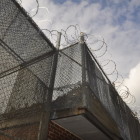
Miller v. Alabama: One Year Later
|
Last year, the Supreme Court declared mandatory life without parole sentences for juveniles to be unconstitutional. A year after the landmark ruling, how have the nation’s juvenile justice systems been impacted?
Juvenile Justice Information Exchange (https://jjie.org/tag/legislation/page/8/)

Last year, the Supreme Court declared mandatory life without parole sentences for juveniles to be unconstitutional. A year after the landmark ruling, how have the nation’s juvenile justice systems been impacted?

Juvenile court judges and their clerks in Massachusetts will see more money in their paychecks in 2014 thanks to a provision in the recently passed $34 billion budget. The phased-in salary increases, the first for judges and clerks since 2006, will total $23 million annually, about 2 percent of the 2014 budget. The budget will increase the salaries of regular associate judges from nearly $130,000 annually to almost $160,000 -- an increase of approximately 23 percent. The Republican reports that under the new budget -- which Gov. Deval Patrick said he will sign next month -- trial court clerk salaries will increase by 22 percent, from $110,000 to approximately $135,000. Assistant court clerks will see their salaries increase by nearly $19,000, and first assistant clerks by $20,000.

The Supreme Court of Mass. shoots down a petitioner’s claim that a state law forbidding the issuance of firearm permits to individuals with juvenile felony records was unconstitutional.

Inmates at the Saline County Juvenile Detention Center in Salina, Kan. are being transferred to a state-run facility this week, following Sheriff Glen Kochanowski’s decision to shutter the center on Friday.

In the lead-up to federal budget sequestration, advocates warned of dire consequences for juvenile justice and services to children and youth. Now, with sequestration in effect for nearly two months, impacts are materializing across the country, although some programs have been at least partially spared. Yet in many cases, youth-serving organizations still do not know how they will be impacted, only that there will be impacts.
Juvenile justice and delinquency prevention programs in many states have yet to see cuts due to sequestration, but the impacts may be felt when 2013 funds are distributed in the fall, said Meg Williams, juvenile justice specialist for the State of Colorado. Although the federal Office of Juvenile Justice and Delinquency Prevention (OJJDP) has not released official numbers, many state programs expect their OJJDP funding to be reduced by 7 or 8 percent and are trying to plan accordingly, she added.

WASHINGTON, D.C. – The National Rifle Association’s task force for improving school safety released a 225-page report Tuesday with a list of recommendations, including the modification of state laws to allow trained staff to carry weapons on campus. Other recommendations included addressing students’ mental health needs and boosting physical security through architectural changes and elements like perimeter fencing around schools. The National School Shield task force also recommended enhanced training programs for school resource officers, who are sworn law enforcement officials on campus duty, and training armed school staff to respond rapidly in case of an emergency. Such training for armed school personnel would last 40 to 60 hours and cost about $800 to $1,000 per person, said Asa Hutchinson, the task force director and a former Congressman from Arkansas, who presented the report. The recommendations were aimed at schools, local and federal governments, and the NRA itself, Hutchinson said.
On Monday, House Bill 242-- Georgia’s comprehensive juvenile reform and statute rewrite legislation -- was approved by the state’s General Assembly. Last week, HB 242 passed a Senate vote; earlier this week, the House unanimously approved the Senate’s changes to the bill, passing the legislation by a 167-0 tally. From its introduction to the House up until its latest General Assembly approval, HB 242 has passed through every full legislative and committee vote with unanimous approval from Georgia’s legislators. The bill, sponsored by Rep. Wendell Willard (R-Sandy Springs) and Sen. Charlie Bethel, a Republican representing Georgia’s 54th district, now heads to the desk of Gov. Nathan Deal -- an early proponent of the legislation -- who is expected to sign the bill into law. HB 242 would include more funding for community-based programs, prohibit the jailing of young people for status offenses and separate designated felonies into two different classes of offense, based upon the severity of the crime.
Photo courtesy of Nebraska State Government
Last week, The Lincoln Journal Star reported that state senators in Nebraska gave unanimous approval to Legislative Bill 464 (LB 464), with the proposed legislation passing through the state’s single-house system with a 39-0 vote. If the bill becomes law, it would require that all criminal charges pressed against individuals ages 18 and younger in the state would have to be filed in a juvenile court. Currently, Nebraska allows juvenile cases to be filed in adult courts before being filed in juvenile courts. With prosecutors having vast authority to decide whether or not a juvenile is charged in an adult or juvenile courtroom, nearly half of the juvenile cases in Nebraska are prosecuted in an adult court. Under LB 464, cases may still be transferred to an adult court, however, pending both a motion by a prosecutor and a previous hearing in a juvenile court.
Photo courtesy of Congressman Bobby Scott
On Thursday, Congressman Robert Scott (D-Va.) and Congressman Walter Jones (R-N.C.) reintroduced the Youth Prison Reduction through Opportunities, Mentoring, Intervention, Support and Education (Youth PROMISE) Act. First proposed in 2009, the Act would alter elements of the Juvenile Justice and Delinquency Prevention Act of 1974 and provide funding and other resources for communities to build and implement evidence-based intervention and prevention strategies to curb youth violence, drug use and gang activity. In neighborhoods with the highest rates of youth crime, the Act would establish special councils consisting of local law enforcement, school and court services representatives, who would develop programs to “redirect” young people who are involved, or may become involved, in the juvenile justice system. Councils established by the Act would also include healthcare providers, social services workers and input from other public and private organizations, such as churches and local businesses. More than 200 organizations -- among them, the Children’s Defense Fund, the National Juvenile Justice Network and the American Bar Association -- have demonstrated support for the Youth PROMISE Act.
Thursday afternoon, House Bill 242 — Georgia’s sweeping juvenile justice reform bill that would also re-write the state’s juvenile code — passed the state Senate vote with unanimous approval. Last week, HB 242 was mildly altered in a Senate Judiciary Committee session. The Senate version of the bill also includes several related legislative proposals, such as House Bill 219, which would give courts the ability to vacate delinquency convictions for underage youth charged with sex crimes in the instance the juveniles were the victims of sexual exploitation or trafficking. The 248-page bill not only impacts juvenile justice in the state, but also includes statute alterations to, among other issues, state laws regarding adoption policies, deprivation cases and parental rights. Rep. Wendall Willard (R-Sandy Spring), the bill’s primary sponsor, has said that the reforms included in HB 242 would ultimately end up saving the state $88 million over five years, primarily by diverting juveniles away from detention facilities and into community-based alternatives.